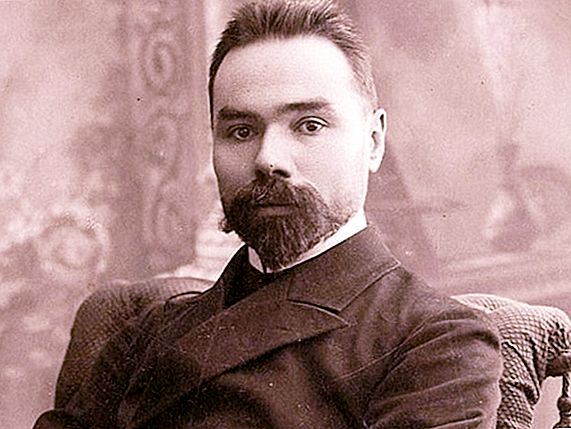REPUBLIC OF THE SOUTHERN CROSS (5)
By:
April 26, 2022

Valery Bryusov
HiLoBooks is pleased to serialize Valery Bryusov’s 1907 proto-sf story “The Republic of the Southern Cross” (“Respublika Iuzhnogo Kresta”) for HILOBROW’s readers.
ALL INSTALLMENTS: 1 | 2 | 3 | 4 | 5 | 6 | 7 | 8 | 9.
The sudden infection of persons present in the audience of theatres or meeting-houses often led to the most tragic catastrophes. Once at a performance of opera some hundreds of people stricken mad in a mass, instead of expressing their approval of the vocalists, flung themselves on the stage and scattered blows right and left. At the Grand Dramatic Theatre, an actor, whose rôle it was to commit suicide by a revolver shot, fired the revolver several times at the public. It was, of course, blank cartridge, but it so acted on the nerves of those present that it hastened the symptoms of the disease in many in whom it was latent. In the confusion which followed several scores of people were killed. But worst of all was that which happened in the Theatre of Fireworks. The detachment of militia posted there in case of fire suddenly set fire to the stage and to the veils by which the various light effects are obtained. Not less than two hundred people were burnt or crushed to death. After that occurrence Horace Deville closed all the theatres and concert-rooms in the town.
The robbers and thieves now began to constitute a grave danger for the inhabitants, and in the general disorganisation they were able to carry their depredations very far. It is said that some of them came to Zvezdny from abroad. Some simulated madness in order to escape punishment, others felt it unnecessary to make any pretence of disguising their open robberies. Gangs of thieves entered the abandoned shops, broke into private lodgings, and took off the more valuable things or demanded gold; they stopped people in the streets and stripped them of their valuables, such as watches, rings, and bracelets. And there accompanied the robberies outrage of every kind, even of the most disgusting. The Nachalnik sent companies of militia to hunt down the criminals, but they did not dare to join in open conflict. There were dreadful moments when among the militia or among the robbers would suddenly appear a case of the disease, and friend would turn his weapon against friend. At first the Nachalnik banished from the town the robbers who fell under arrest. But those who had charge of the prison trains liberated them, in order to take their places. Then the Nachalnik was obliged to condemn the criminals to death. So almost after three centuries’ break capital punishment was introduced once more on the earth. In June a general scarcity of the indispensable articles of food and medicine began to make itself felt. The import by rail diminished; manufacture within the town practically ceased. Deville organised the town bakeries and the distribution of bread and meat to the people. In the town itself the same common tables were set up as had long since been established in the factories. But it was not possible to find sufficient people for kitchen and service. Some voluntary workers toiled till they were exhausted, and they gradually diminished in numbers. The town crematoriums flamed all day, but the number of corpses did not decrease but increased. They began to find bodies in the streets and left in houses. The municipal business — such as telegraph, telephone, electric light, water supply, sanitation, and the rest, were worked by fewer and fewer people. It is astonishing how much Deville succeeded in doing. He looked after everything and everyone. One conjectures that he never knew a moment’s rest. And all who were saved testify unanimously that his activity was beyond praise.
Towards the middle of June shortage of labour on the railways began to be felt. There were not enough engine-drivers or conductors. On the 17th of July the first accident took place on the South-Western line, the reason being the sudden attack of the engine-driver. In the paroxysm of his disease the driver took his train over a precipice on to a glacier and almost all the passengers were killed or crippled. The news of this was brought to the town by the next train, and it came as a thunderbolt. A hospital train was sent off at once; it brought back the dead and the crippled, but towards the evening of that day news was circulated that a similar catastrophe had taken place on the First line. Two of the railway tracks connecting Zvezdny with the outside world were damaged. Breakdown gangs were sent from Zvezdny and from North Port to repair the lines, but it was almost impossible because of the winter temperature. There was no hope that on these lines train service would be resumed — at least, in the near future.
RADIUM AGE PROTO-SF: “Radium Age” is Josh Glenn’s name for the nascent sf genre’s c. 1900–1935 era, a period which saw the discovery of radioactivity, i.e., the revelation that matter itself is constantly in movement — a fitting metaphor for the first decades of the 20th century, during which old scientific, religious, political, and social certainties were shattered. More info here.
SERIALIZED BY HILOBOOKS: James Parker’s Cocky the Fox | Annalee Newitz’s “The Great Oxygen Race” | Matthew Battles’s “Imago” | & many more original and reissued novels and stories.
